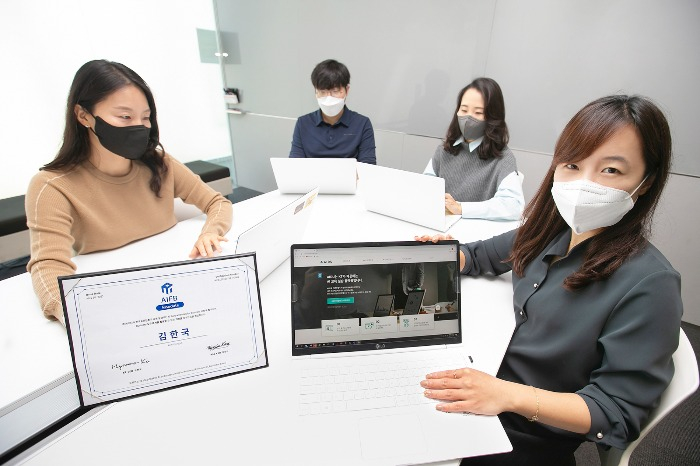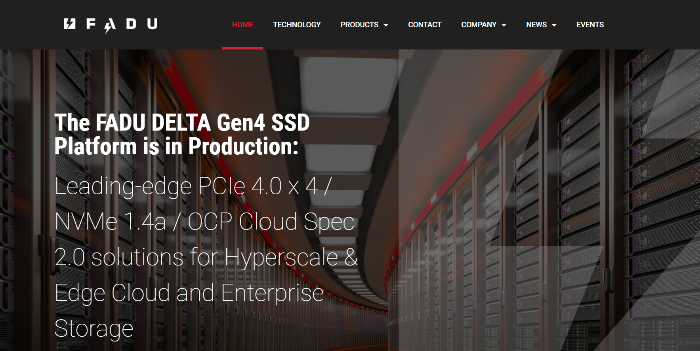Telecom giant KT to develop its own NPU, AI ecosystem
Like David and Goliath, KT gears up to take on US chip makers in the AI space
By Dec 29, 2021 (Gmt+09:00)
LG Chem to sell water filter business to Glenwood PE for $692 million


Kyobo Life poised to buy Japan’s SBI Group-owned savings bank


KT&G eyes overseas M&A after rejecting activist fund's offer


StockX in merger talks with Naver’s online reseller Kream


Mirae Asset to be named Korea Post’s core real estate fund operator



Telecommunications giant KT Corp. announced concrete plans to launch its artificial intelligence infrastructure business by joining forces with industry leaders at home and abroad.
The country’s second-largest wireless carrier plans to strengthen the cloud software service and aims to introduce its own AI semiconductor network processor (NPU) in the latter half of 2023.
PARADIGM-SHIFTING ECOSYSTEM
Entering the AI infrastructure market is an ambitious move where California-based NVIDIA has a 90% market share. KT’s game plan is creating an AI computing ecosystem that encompasses both software and hardware. When realized, companies in Korea will no longer be dependent on NVIDIA’s GPU-based service.
“CEO Ku Hyeon-mo’s plan of action is to make the AI infrastructure business the main driver for the company’s growth going forward,” a high-level employee at KT told The Korea Economic Daily.
Other key players in the market are mostly US companies as well; namely Intel Corp., IBM, Xilinx, Advanced Micro Devices (AMD,) to name a few.
In fact, KT plans to work with California-based multinational semiconductor company AMD and FADU, a fabless startup developing advanced flash storage technology that is based in Seoul and Silicon Valley.
LEASING AI INFRASTRUCTURE ON DEMAND
The action plan was announced at Tuesday’s briefing for “Hyperscale AI computing (HAC) service,” targeting companies that are developing AI services in biotech, educational technology, and manufacturing, among others.
Hyperscale AI commonly refers to a highly sophisticated form of AI that uses and analyzes massive datasets to make autonomous decisions. KT has dubbed its own cloud-based AI infrastructure service as HAC, commercialized on Dec. 10.
KT’s HAC allows companies to borrow graphics processing units (GPU) in a virtual environment, a must for developing AI services. Each client then returns and pays for a specified amount of GPUs after a certain period.
This is the first pay-by-usage AI infrastructure service in the country.
Kim Joo-seong, a manager at KT’s cloud business division said, “Companies will lower costs some 50-70% by doing away with the traditional system of paying for GPUs with a set payment regardless of the usage.”
Kim explained that while GPU is a must for AI service adoption, it is only used for the data analysis and model learning phase, not the entirety of the development period.
The Korean telecommunications juggernaut developed what it dubs a “multi-solution,” which allows its clients to use GPUs made by different manufacturers. For instance, a KT HAC client can use GPUs made by NVIDIA in conjunction with those made by AMD.
Using different companies’ GPUs in service development was not possible before due to the conflict in the models’ programming languages. This is why companies could not diversify their GPU supplies even after NVIDIA’s higher-end GPU products jumped 50% in price this year, on the back of rising popularity of metaverse services and bitcoin mining.

FOUR STEPS TO COMPLETING AI INFRASTRUCTURE ECOSYSTEM
There will be four different steps in KT’s AI infrastructure business.
The telecom juggernaut plans to establish a large-scale “GPU farm” next year, which is compatible with thousands of GPUs from different manufacturers like NVIDIA and AMD. A GPU farm is a set of servers that allocate resources to perform calculations in the most efficient way possible.
In 2023, it will add AI semiconductors specifically developed for KT HAC in conjunction with FADU to the GPU farm. The plan is to lower companies’ reliance on overseas GPU manufacturers, mostly in the United States.
After the two steps are realized, KT can begin a more comprehensive service that encompasses both hardware and software.
The long-term goal for KT is to create its own AI standard model and offer subscription-based AI solutions optimized by industry; for example, self-driving vehicles, finance, and the metaverse.
It is also strengthening its collaboration with the Korean government.
Seoul has long grappled with the absence of domestic technology that can create AI infrastructure. The Ministry of Science and ICT and other government agencies have invested some 300 billion won ($252.9 million) in such an endeavor.
While a handful of companies are developing AI semiconductors and platforms in Korea, experts say separate developments on software and hardware fronts have not been conducive to creating a comprehensive ecosystem.
Write to Seon Han-gyeol at always@hankyung.com
Jee Abbey Lee edited this article.
-
 Business & PoliticsTrump Jr. meets Korean business chiefs in back-to-back sessions
Business & PoliticsTrump Jr. meets Korean business chiefs in back-to-back sessionsApr 30, 2025 (Gmt+09:00)
-
 Korean chipmakersSamsung in talks to supply customized HBM4 to Nvidia, Broadcom, Google
Korean chipmakersSamsung in talks to supply customized HBM4 to Nvidia, Broadcom, GoogleApr 30, 2025 (Gmt+09:00)
-
 EnergyLS Cable breaks ground on $681 mn underwater cable plant in Chesapeake
EnergyLS Cable breaks ground on $681 mn underwater cable plant in ChesapeakeApr 29, 2025 (Gmt+09:00)
-
 Business & PoliticsUS tariffs add risk premium to dollar assets: Maurice Obstfeld
Business & PoliticsUS tariffs add risk premium to dollar assets: Maurice ObstfeldApr 29, 2025 (Gmt+09:00)
-



